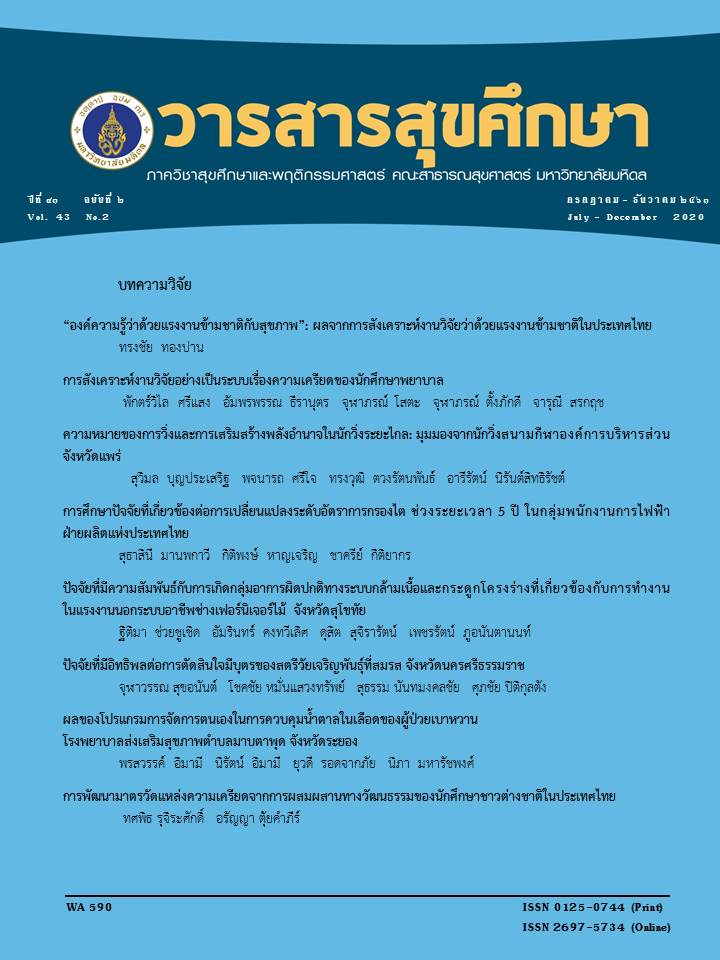Health Promotion Program with Family Participation among Uncontrolled Type 2 Diabetic Elderly
Keywords:
Elderly, Type 2 Diabetes, Health Promotion Program, Family ParticipationAbstract
The quasi-experimental research aimed to study the health promotion program with family participation among uncontrolled type 2 diabetic elderly by applying the concept of health beliefs model and the concept of social support theory with family participation on the knowledge about diabetic, perceived risk, perceived severity, perceived benefits and barriers, self-care practice, and blood sugar level of the uncontrolled type 2 diabetic elderly in Phanomsarakham District, Chachengsao Province. The samples were 66 elderly aged 60-69 years divided into the experimental group and comparison group with 33 elderly in each group. The program consisted of 5 activities including; Diabetes Knowledge Awareness, Good Care and Routine Practice, Choosing a Safe Life, Follow Up and Prompted Support by Online Media, and Diabetes Relieving Contract. The program was designed for family member participation. The data were collected using questionnaires which included general characteristics, knowledge, perception, and self-care practice of the elderly toward diabetic. Data were analyzed using frequency, percentage, mean, standard deviation, Chi-square, Paired t-test, and Independent t-test.
The results showed that after the experiment, the average knowledge score on perception of susceptibility, perception of severity, perceived benefits and barriers to self-care, and self-care practices of the experimental group were significantly higher than the comparison group with statistical significance (p<0.05). Also, they were able to control blood sugar levels better than the comparison group after the experiment. It is suggesed that health agencies could implement the program among uncontrolled type 2 diabetic elderly to provide them with better health.
It is suggesed that health agencies could implement the program among uncontrolled type 2 diabetic elderly to provide them better health.
References
Diabetes Association in Thailand under The Patronage of Her Royal Highness Princess Maha Chakri Sirindhorn. Diabetes statistics in Thailand [Internet]. 2019. [cited 2019 November 20]. Available from: https:// www.dmthai.org/index.php/knowledge/for-normal-person/health-information-and articles/health-information-and-articles-old-2/481-2018-02-05-09-40-68.
Division of Non Communicable Diseases. Chronic non-communicable diseases information [Internet]. 2018. [cited 2019 November 20]. Available from: http:// www.thaincd.com/information-statistic/non-communicable-disease-data.php
Mokmula M. Knowledge integration Islamic provisions and chronic health promotion. Songkhla: Southern Institute of Health System Research, Prince of Songkla University; 2009.
Division of Non Communicable Diseases. Number and mortality rate of non-communicable diseases 2016–2018 [Internet]. 2019. [cited 2019 November 19]. Available from: http://www.thaincd.com/2016/mission/documentsdetail.php?id=13653&tid=32&gid=1-020
Bureau of Non-Communicable Diseases. Number and rate of non-communicable diseases and injuries for the calendar year 2015 [Internet]. 2016. [cited 2018 August 25]. Available from: http://thaincd.com/information-statistic/non-communicable-disease-data.php
Nongwha Health Promoting Hospital. Diabetes health survey of the year 2018 [Internet]. 2018. [cited 2018 June 9]. Available from: http://www.govesite.com/Bansong/content.
Lewin K. Frontiers in group dynamics: concept, method, and reality in social science; social equilibrium and social change. Human Relations 1947;1(1):5-40.
House JS. The nature of social support. In MA. Reading (Ed). Work stress and social support Philadephia: Addison Wesley 1981:13-23.
Suksawat N, Pranphawit A, Petchmanee S. The effect of a health education program by applying self-efficacy theory with social support for self-care in the elderly with diabetes, Thasathon Health Promoting Hospital, Phunphin District, Surat Thani Province. Journal of Community Health Development Khon Kaen University 2016;4(1):49-65.
Hahmwong S, Bancharahatthakit P. The effect of a health education program by applying self-efficacy theory together with social support in type 2 diabetic patients receiving services at Ban Nong Kung Phak Subdistrict Health Promotion Hospital, Nong Kung Si District, Karasin Province. Srinagarind Medical Journal 2013;28(4):451-60.
Noppophon S. The effect of a health promotion program on health promoting behaviors of type 2 diabetes patients, Bang Toey Subdistrict, Mueang District, Chachoengsao Province. Ratchanakarin Journal 2016;13(30):161-71.
Suksawat N, Pranprawit A, Petchmanee S. The effect of the health education program by applying Using self-efficacy theory and social support for self-care in the elderly with diabetes at Tha Sathon Health Promotion Hospital, Phunphin District, Surat Thani Province. Journal of Community Health Development Khon Kaen University 2016;4(1):49-65.
Permsilp S, Duangsong R. The effect of applying the health belief pattern theory together with social support to control blood sugar levels of type 2 diabetic patients who come to services at Ubonrat Hospital. Ubonrat District Khon Kaen Province. Khon Kaen University Research Journal (Graduate version) 2011;11(4):89-100.
Hempler NF, Ekholm O, Willaing I. Differences in social relations between persons with type 2 diabetes and the general population. pubmed [Internet]. 2013. [cited 2018 September 28]. Available from: https://www.ncbi.nlm.nih.gov/pubmed/23554389
Chachoengsao Provincial Health Office. Report of Ministry of Public Health's performance, indicators and supervision for the year 2018 [Internet]. 2018. [cited 2018 June 9]. Available from: http://www.cco.moph.go.th/cco24/MOU/11_MOU_2561.pdf
Chachoengsao Provincial Health Office. Health status information Health Data Center Ministry of Public Health [Internet]. 2018. [cited 2018 July 16]. Available from: http://hdc.cco.moph.go.th/hdc/main/index.
Lemshow S, Hosmer DW, Klar J, Lwanga S. Adequacy of sample size in health studies. New York: Wiley & sons; 1990.
Kluding S, Rucker B, Curry G. Feasibility and effectiveness of a pilot health promotion program for adults with type 2 diabetes: lessons learned. Pubmed [Internet]. 2010. [cited 2018 September 28]. Available from: https://www.ncbi.nlm.nih.gov/pubmed/20530663
Nopsophon S. The effect of a health promotion program on health promoting behaviors of type 2 diabetes patients, Bang Toey Subdistrict, Mueang District, Chachoengsao Province. Ratchanakarin Journal 2016;13(30):161-71.
Krabuanpatana C. Extend life, extend friendship. Nonthaburi: Sahamit Printing and Publishing; 2007.
Waebuesa N. Relationship between perception of health status and self-care of diabetes mellitus patients in amphoe panarea changwat pattani. [Master of Education thesis Health Promotion Program. Songkhla: Prince of Songkla University; 2008.
Prasertumphaisakul N. Factors predicting hyperglycemic preventive behaviors of diabetic elderly who cannot control blood sugar levels. [Master of Nursing Thesis Family Practice Nurse Program. Bangkok: Thammasat University; 2007.
Vilai P. Factors affecting cooperation in type 2 diabetes patients. Thammasat Medical Journal 2010;10(2):125-135.
Rangsa J, Rodjarkpai Y, Pongsangphan P. The results of the empowerment program of caregivers and elderly patients with diabetes Kantharawichai District Mahasarakham province. Srinakarin Journal 2016;31(6):377-83.



